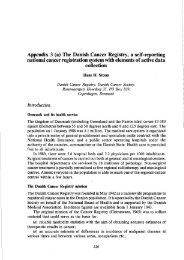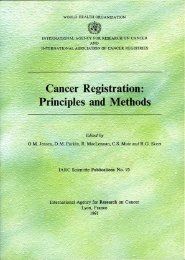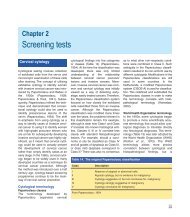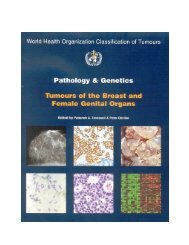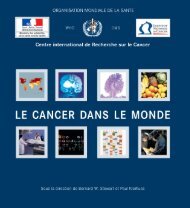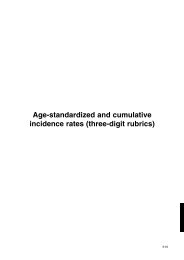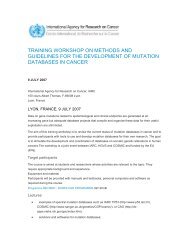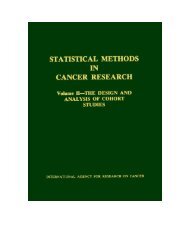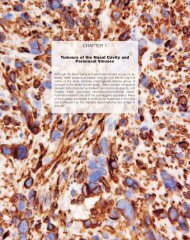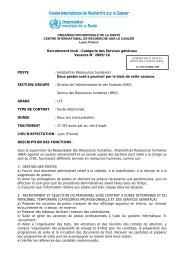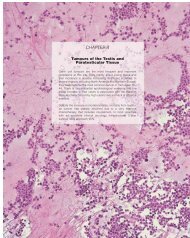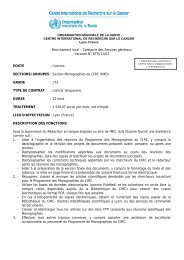world cancer report - iarc
world cancer report - iarc
world cancer report - iarc
You also want an ePaper? Increase the reach of your titles
YUMPU automatically turns print PDFs into web optimized ePapers that Google loves.
WHO has recommended that in developed<br />
countries one half of the available<br />
resources for <strong>cancer</strong> care should be devoted<br />
to palliative care, i.e. that the resources<br />
available for palliative care should equal<br />
the combined resources available for all<br />
anti<strong>cancer</strong> treatment – surgery, radiotherapy<br />
and chemotherapy. WHO recommended<br />
that in less developed countries at least<br />
80% of resources should be available for<br />
palliative care, noting that there is no other<br />
measure which can improve the quality of<br />
life of the population as much as widely<br />
available palliative care.<br />
COMPLEMENTARY AND<br />
ALTERNATIVE MEDICINE<br />
A majority of <strong>cancer</strong> patients in most developed<br />
countries probably use complementary<br />
therapies as adjuncts to mainstream<br />
care for symptom management and quality<br />
of life. A smaller proportion use “alternative”<br />
remedies, unproved methods that<br />
typically are invasive, biologically active,<br />
and often promoted as literal alternatives<br />
to evidence-based oncology treatment.<br />
These methods tend to involve considerable<br />
travel and expense. Many are associated<br />
with significant risks of adverse<br />
events or substantial delays in receipt of<br />
needed care. Many alternatives, such as<br />
high-dose vitamin C supplements, special<br />
diets, shark cartilage, Iscador, and laetrile,<br />
have been studied and found ineffective.<br />
Conversely, the benefits of some complementary<br />
therapies are well documented.<br />
Randomized trials support the value of<br />
hypnosis and acupuncture for pain and<br />
nausea, of relaxation therapies, music<br />
therapy and massage for anxiety, pain and<br />
depression, of yoga, tai chi and meditation<br />
for improved strength and stability.<br />
These and other complementary therapies<br />
increasingly are provided in mainstream<br />
<strong>cancer</strong> programmes. Some complementary<br />
therapies, such as psychological<br />
support, humour therapy and spiritual<br />
assistance, have been available for<br />
decades as “supportive” care in oncology<br />
Palliative care and <strong>cancer</strong> pain <strong>world</strong>wide<br />
Global improvements in palliative care do<br />
not depend so much upon the creation of<br />
specialized palliative care services separate<br />
from mainstream health care, but<br />
upon the permeation of the whole health<br />
care system by the principles of palliative<br />
care. This in turn is dependent upon a<br />
major planning exercise with administrative,<br />
education and research implications.<br />
Specialized demonstration programmes<br />
are justified to assist in this undertaking.<br />
There is now a vast store of information<br />
medicine. In this sense, complementary<br />
medicine may be seen as an extension and<br />
expansion of earlier efforts to focus on<br />
patients’ broader needs (Cassileth BR, The<br />
Alternative Medicine Handbook: The<br />
Complete Reference Guide to Alternative<br />
and Complementary Therapies, WW Norton<br />
& Company, 1998).<br />
Botanicals hold largely untapped promise,<br />
requiring serious research to document<br />
their value against <strong>cancer</strong> or capacity to<br />
enhance well-being (Duke JA, The Green<br />
Pharmacy, New York, Rodale Press, 1997;<br />
Tyler VE, Herbs of Choice: The Therapeutic<br />
Use of Phytomedicinals, 1993 and Tyler VE,<br />
The Honest Herbal: A Sensible Guide To The<br />
Use of Herbs and Related Remedies, 1994,<br />
both by Pharmaceutical Press).<br />
However, many herbal remedies are toxic<br />
or contaminated, or interact negatively<br />
with pharmaceuticals. St. John’s Wort, for<br />
example, a useful herb for mild and moderate<br />
depression, is now known to decrease<br />
blood levels of protease inhibitors,<br />
cyclosporine and other immunosuppressive<br />
drugs, birth control pills, cholesterol<br />
medications, Coumadin, and chemotherapeutic<br />
agents. Such problems require that<br />
oncologists remain vigilant to potential<br />
interactions many, if not most, of which,<br />
remain undocumented. It is probably safest<br />
for patients to stop herbs and other nonprescription<br />
products during receipt of <strong>cancer</strong><br />
treatments.<br />
concerning developments in palliative<br />
care internationally, whether involving<br />
specialized palliative care services or<br />
mainstream health care systems and<br />
guidelines have been developed by relevant<br />
authorities, including the<br />
International Association of Hospice and<br />
Palliative Care.<br />
There are problems in all contexts, but<br />
improvements have begun to be recognized.<br />
Less developed countries vary with<br />
regard to palliative care services. In developed<br />
countries the problem is that of<br />
patchy application of the vast body of<br />
Fig. 6.23 Massage as a form of relaxation therapy<br />
Both the helpful and the problematic components<br />
of complementary and alternative<br />
medicine are likely to persist in <strong>cancer</strong><br />
medicine. The challenge for the physician<br />
and for the patient is to promote and<br />
utilize beneficial complementary therapies<br />
and discard disproved alternatives.<br />
In recent years, increasingly greater integration<br />
of complementary and conventional<br />
medicine has occurred, creating<br />
integrative medicine. This synthesis of<br />
the best of complementary therapies and<br />
mainstream care lights the way to the<br />
more comprehensive, humane, and needed<br />
<strong>cancer</strong> care that hopefully will characterize<br />
the future of oncology.<br />
Palliative care 299



